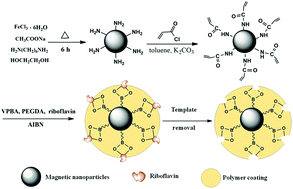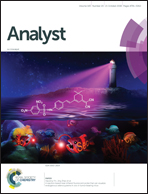Efficient synthesis of riboflavin-imprinted magnetic nanoparticles by boronate affinity-based surface imprinting for the selective recognition of riboflavin†
Abstract
Riboflavin (vitamin B2), a cis-diol-containing compound, is an essential vitamin for maintaining human health mainly in energy metabolism and is a critical component of enzyme cofactors and flavoproteins. Thus, the determination of riboflavin in food products is essential in riboflavin-fortified foods. However, analysis of riboflavin at natural levels in foods or biological samples is difficult because of its very low concentration level and the presence of undesirable matrix effects which could interfere with the measuring system. Thus, it is essential to develop efficient and selective enrichment approaches for riboflavin. Molecularly imprinted polymers can be well used for riboflavin extraction and pre-concentration from food samples. In this study, we present riboflavin-imprinted magnetic nanoparticles as an ideal sorbent for the selective enrichment of riboflavin followed by direct fluorometric determination. The riboflavin-imprinted magnetic nanoparticles were prepared according to a newly reported strategy, called boronate affinity-based surface initiated imprinting. Magnetic nanoparticles and vinylphenylboronic acid were used as supporting materials and a functional monomer, respectively. The prepared riboflavin-imprinted magnetic nanoparticles exhibited several significant advantages, such as excellent selectivity, high binding affinity and low binding pH toward riboflavin, which made the molecularly imprinted material become an ideal sorbent for the selective enrichment of riboflavin. The prepared riboflavin-imprinted magnetic nanoparticles were successfully applied to the analysis of riboflavin in milk.



 Please wait while we load your content...
Please wait while we load your content...